 Petzlover
Petzlover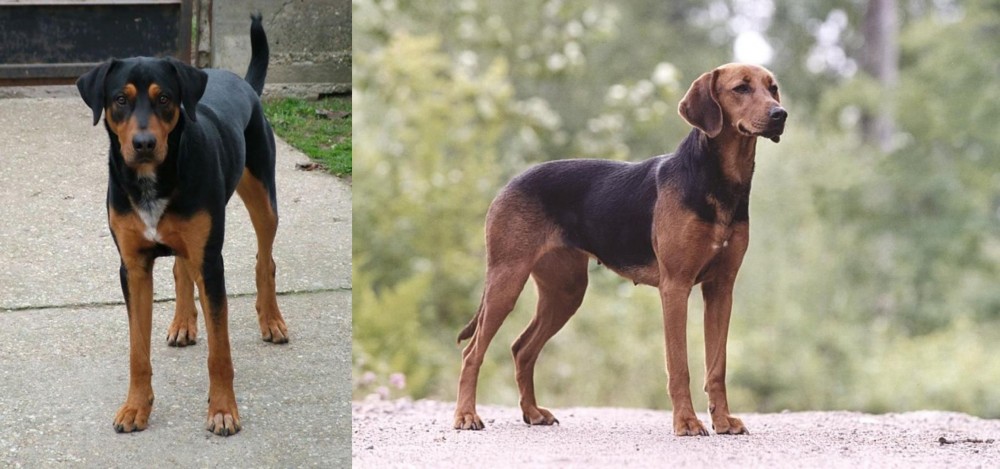 Hungarian Hound is originated from Hungary but Schillerstovare is originated from Sweden. Both Hungarian Hound and Schillerstovare are having almost same height. Both Hungarian Hound and Schillerstovare are having almost same weight. Hungarian Hound may live 3 years less than Schillerstovare. Both Hungarian Hound and Schillerstovare has almost same litter size. Both Hungarian Hound and Schillerstovare requires Low Maintenance.
Hungarian Hound is originated from Hungary but Schillerstovare is originated from Sweden. Both Hungarian Hound and Schillerstovare are having almost same height. Both Hungarian Hound and Schillerstovare are having almost same weight. Hungarian Hound may live 3 years less than Schillerstovare. Both Hungarian Hound and Schillerstovare has almost same litter size. Both Hungarian Hound and Schillerstovare requires Low Maintenance.
 The Hungarian Hound, also known as the Transylvanian Hound, originated in ancient Hungary as a hunting dog. At the time there were Asian Hounds that traveled with Hungarian Magyar tribes into Transylvania. As early as the 9th century it is believed that these Hungarian dogs were crossed with Celtic Hounds and local dogs. The result is the Hungarian Hound. These dogs were incredibly popular throughout Transylvania.
The Hungarian Hound, also known as the Transylvanian Hound, originated in ancient Hungary as a hunting dog. At the time there were Asian Hounds that traveled with Hungarian Magyar tribes into Transylvania. As early as the 9th century it is believed that these Hungarian dogs were crossed with Celtic Hounds and local dogs. The result is the Hungarian Hound. These dogs were incredibly popular throughout Transylvania.
This scent hound almost became extinct but was saved by intense breeding during the latter part of the 21st century. They developed two kinds, short and tall, for different types of hunting. The tall dogs hunted boar, bison, lynx and bear. The short dogs hunted hare, fox and chamois.
Only the tall dogs exist today. Some Hungarians raided parts of Europe and took the dogs with them. There was then a crossing breeding with Polish dogs. The tall dogs exist today in Hungary and Romania. The Hungarian Kennel Club recognized the breed and the United Kennel Club (UKC) from the United States recognizes them. No major clubs such as the AKC (American Kennel Club) or the British Clubs. The breed was accepted into the AKC Foundation Stock Service Program
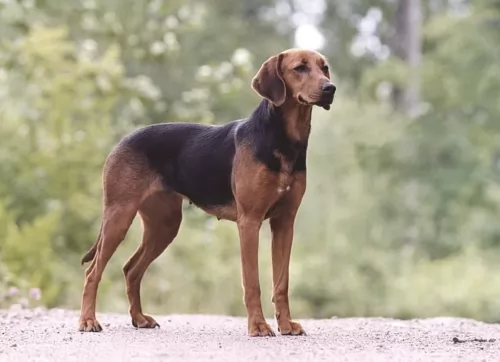 The Schillerstövare originated in Sweden, being named after a Swedish farmer, Per Schiller. After he died, the dog was named Schillerstövare in 1907, and was Sweden's first native dog breed.
The Schillerstövare originated in Sweden, being named after a Swedish farmer, Per Schiller. After he died, the dog was named Schillerstövare in 1907, and was Sweden's first native dog breed.
The Swedish Kennel Club recognised this dog in 1907 and it is also recognised by the Federation Cynologique Internationale as well as a number of minor kennels and dog clubs.
The dog has always been used as a hunting dog and the English Foxhound is the e foundation for this breed.
 The Hungarian Hound is a medium sized dog, a scent hound with the same characteristics of the type of hunting hounds found in Mid-Europe. The breed is a hardy one with a long head slightly domed skull. The muzzle is short, and the jaws are strong. The lips are black, and the ears are round and hang. Their eyes are shaped like almonds and dark brown. The breed has large paws with cushioned pads and strong toes.
The Hungarian Hound is a medium sized dog, a scent hound with the same characteristics of the type of hunting hounds found in Mid-Europe. The breed is a hardy one with a long head slightly domed skull. The muzzle is short, and the jaws are strong. The lips are black, and the ears are round and hang. Their eyes are shaped like almonds and dark brown. The breed has large paws with cushioned pads and strong toes.
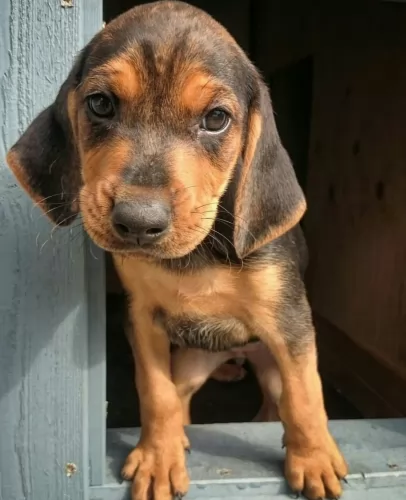 The Schillerstövare is a medium to large sized dog. They’re athletic and muscular.
The Schillerstövare is a medium to large sized dog. They’re athletic and muscular.
Standing at between 53–61cm in height and weighing in the region of 18–25kg, the coat of the dog is fairly short and harsh, with the color being black and tan.Sometimes you’ll see some white markings on the chest and paws.
The head is domed, the eyes brown, bright and alert and the ears of the dog are broad, medium length and floppy. The long tail is carried low or held out when running or alert.
If you allow your Schillerstovare to have puppies, you can expect between 3 to 7.
The Schillerstovare is a calm dog but he can get petty lively when there’s a game to be had. He gets on well with well disciplined children who have been taught to be kind and respectful to animals. He also gets on well with pets in the home. Just like with most other dogs, he will need to be trained and socialized as he is a strong willed, confident, dominant dog.
He is friendly and active but will be somewhat reserved around strangers.These dogs will require a lot of exercise and will need quite a bit of space too. They aren't well suited to small properties in the city. He will need a daily walk but also a chance to get off his leash and run free in the park. Other forms of exercise such as hikes, ball game and swimming will delight him.
 Children friendliness – This breed is very friendly with children.
Children friendliness – This breed is very friendly with children.
Special talents - Hunting independently and at a distance from the hunter.
Adaptability – Not an apartment dog. They need space and land.
Learning ability – They are very independent and intelligent.
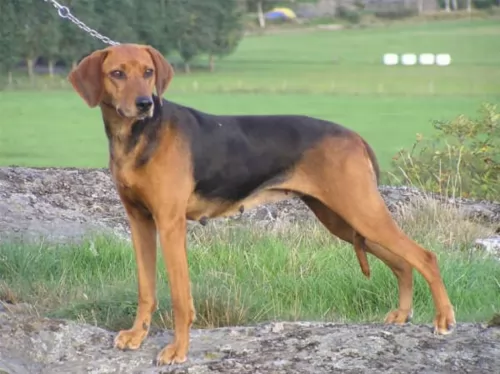 Schillerstovares are social, loving, friendly, loyal dogs who enjoy being around their human family. He’s going to need a lot of exercise, both mental and physical to keep him from boredom and frustration.
Schillerstovares are social, loving, friendly, loyal dogs who enjoy being around their human family. He’s going to need a lot of exercise, both mental and physical to keep him from boredom and frustration.
He will rely on you for at least a daily walk. He is strong-will and confident and will do well in a family where they are active and where they are firm, patient, kind and consistent in their behaviour towards him because then he ticks all th right boxes for being a splendid pet.
 Even though this is an ancient breed they do face certain medical issues such as:
Even though this is an ancient breed they do face certain medical issues such as:
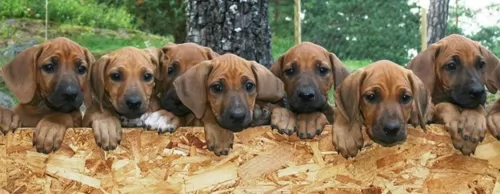 Even though your Schillerstovare is a healthy dog breed, hip dysplasia is a common dog disease that many dogs get.
Even though your Schillerstovare is a healthy dog breed, hip dysplasia is a common dog disease that many dogs get.
This is a skeletal disease when a dog’s hip joints become partially dislocated. It can be very difficult for your dog to get around, and he can also develop arthritis. It gets very sad when your dog doesn’t even want to participate in games anymore.
 Feeding the puppy – 1-3 cups of high quality food served in 3-5 meals per day.
Feeding the puppy – 1-3 cups of high quality food served in 3-5 meals per day.
Feeding the adult – 3-5 cups of high quality food served in 2-3 meals a day.
Points for Good Health – generally healthy
Games and Exercises – The Hungarian Hound is a hunting dog and therefore accustomed to and bred for a high level of exercise. Their instinct for hunting is really strong so make sure you do not let them off leash outside of a contained area. They excel at tracking, field trials, lure chasing, and fly ball.
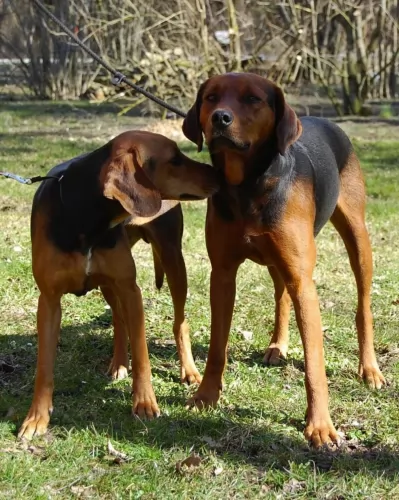 With his short coat, the Schillerstovare is considered a low maintenance dog and requires a minimal amount of grooming. Brushing should be done twice a week to remove loose hair. The harsh outer coat seems to repel dirt and dust.
With his short coat, the Schillerstovare is considered a low maintenance dog and requires a minimal amount of grooming. Brushing should be done twice a week to remove loose hair. The harsh outer coat seems to repel dirt and dust.
Trim your pet’s nails, check inside his ears for signs of redness, make sure his eyes are bright and clear and make sure he doesn’t have any unusual lumps on him.
Make sure his vaccines are up to date to avoid deadly canine diseases. Take him to the vet when you suspect he isn’t his normal self.
Dogs, just like humans, do well on good, nutritious diets. Feed a human lots of junk food and sweets and they’ll grow up to be obese and unhealthy. That's exactly how it is with dogs too. Some of the best commercially manufactured dog foods are convenient and they can be good if you look at the top brands. Look for ones that cater for your dog’s age, size, breed and activity levels. This dry kibble can be made more inviting for your pet when you include some homemade food.
Dogs just want simplicity so that they don’t battle with digestive problems. Boiled chicken, sweet potatoes, brown rice or pasta, carrots and spinach will be wonderful for him when you chop the food up and add it into the dry kibble twice a week. See his tail wag and his brown eyes light up when he smells this treat. Some raw meat added up occasionally will also contribute to your pet’s heath.
Make sure he is never without a constant supply of fresh, cool water.